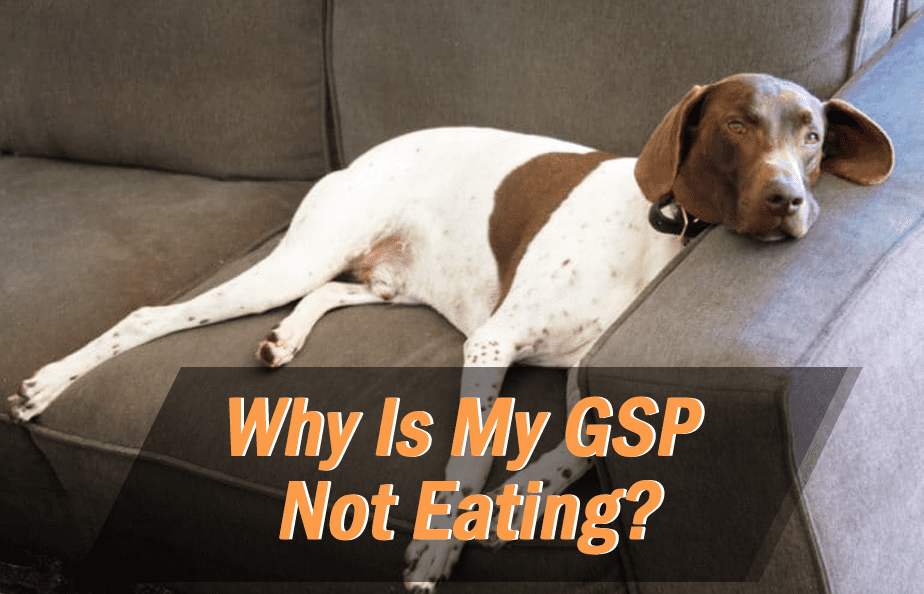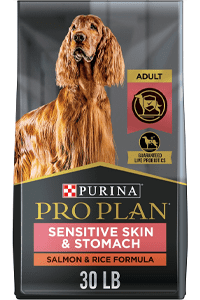Are you wondering why my GSP is not eating? A characteristic that makes dogs so attractive is their cute puppy eyes when anything is placed in front of them. But if your GSP is disinterested in food, it can be distressing.
Well, you’re not alone! German Shorthaired Pointers are active and highly energetic dogs, and it is not uncommon to sometimes see a GSP not eating or with a low appetite. Also, feeding the right amount of food at the proper life stage is paramount for their healthy well-being.
This article will look into a few questions you may have, such as:
- Why won’t my GSP eat?
- How can dogs become picky eaters?
- Why is my dog suddenly refusing to eat?
Your GSP may not be eating because of health issues such as bloating, dental diseases, or inflammation in the body. It could also be because of behavioral issues such as being a fussy eater or when they tend to be aggressive towards other pets or humans in the surroundings.
But don’t worry. Below are many reasons why a GSP is not eating and ways to make a GSP eat. So, relax and enjoy reading this article to get more info on getting your GSP’s lifestyle back on track!

How do I get my GSP to eat?
Firstly, you should know that GSPs need a good balance of fat and protein in their daily diet. Because of their energetic lifestyle, their energy consumption per body weight is very high compared to other breeds. In fact, if you live in cold weather or take your GSP for hunting, your GSP needs substantially more food.
While there are many ways to let your GSP’s appetite back, I have tried the ones mentioned below over the years, and they work. But again, all dogs are different, so it is best to follow whichever method you think will work best on your dog.
Purina Pro Plan Adult Sensitive Skin & Stomach Salmon & Rice Formula Dry Dog Food
- Excellent for your GSP with a sensitive stomach.
- Includes omega-6 fatty acids to help support a healthy skin and coat.
- Check it out below.
Change the food texture
Now, you may not realize it, but the food texture is also an important factor to consider when feeding your dog. The texture is vital to enjoy the food and increase its palatability. Some dogs like it dry, while some enjoy mushy and moist foods.
If you have been feeding dry kibble to your GSP, it’s time to change! You can switch the kind meal itself by changing to rice and meat, or if you want to stick with dry kibble, then soak it in warm water and then serve!
Yes! Dogs love it when their dry kibble is soaked and mushy. Make sure that you don’t make it too runny, though. Soak the kibble in enough water to make it swell. If your dog loves milk, you can even soak your dry kibble in milk and then serve.
Warm the food
Serving your dog’s food warm? Does it feel like a new idea? If yes, then get used to it! We say dogs are just like humans, and it isn’t true in terms of emotions but also terms of food habits. Dogs always enjoy warm foods.
Warm foods release an extra aroma of the food when served, which makes them very tempting for dogs. Hence, warm foods feel fresh and smell good, increasing a dog’s appetite. We all know how dogs take time to sniff their food before diving into it.
Add something yummy
Dogs are adventurous and curious, so they will want to try anything that’s new. By this, I mean adding treats or yummies that you usually don’t give your dog. I call them “extras” because these are not items you can give them daily.
If you want your GSP’s appetite back, then take the effort to first talk to the vet and check if the extras you intend to give your dog are fine. I have occasionally added these extras to my GSP’s meals so they enjoy the meals to the fullest.
Here are a few items you can add to your GSP’s plate:
- Sardines
- Pork or beef bone broth
- Vegetables such as carrots, pumpkin puree, or sweet potatoes
- Raw eggs
- Coconut oil
- Goat’s milk
- A tiny amount of clarified butter
If you think your GSP is not eating because of ill health, switching to a bland diet could help. Dogs are very picky when sick, and anything with a strong aroma can instantly put them off.
Also, a bland diet will be easier on their digestive system, which is already weak when sick. You can incorporate white rice and lean meat such as chicken or turkey. Sweet potato is also a good option when your dog is ill.
Hand-feed your GSP
It may surprise you, but hand-feeding your dog can make them feel extra loved and compelled to eat. This is especially true if your dog is not feeling well. They enjoy the love and comfort when their owners are always close to them and taking special care.
Another trick is to mash the meat or the food chunks on your hand and let your dog sniff it. There are 99% chances of your dog eating what’s on your hand when you do that!
Exercise and eat
Exercise is a natural appetite stimulant in humans as well as dogs. Since German Shorthaired Pointers are very active and love to always be on the move, getting them to exercise is an easy task. Exercising will help them burn calories and make them feel hungry right after.
Play and eat
One thing you must know about GSPs is that they are big people pleasers! They will do anything to have your attention and listen to your commands to gain your love. Hence, training is one method to get your GSP to eat.
Giving them small meals or treats after every training session will enable your dog to eat throughout the day in small portions, which is a good start. Also, they will think of training as a way to get a prize which is FOOD!
Also, if your dog is not eating because of anxiety or any other emotional problems, then training will distract their minds and release endorphins that will keep them happy!
However, this shouldn’t be tried if your dog is not eating because of ill health. In such a case, you must try to indulge them in eating by bringing their favorite toy or playing around with them.
Use appetite stimulants
Using appetite stimulants can greatly help in getting your GSP to eat. You can use appetite stimulants if your GSP’s lost appetite is starting to affect their health. There are different appetite stimulants but always ask your vet before administering them to your dog.
Some of the common appetite stimulants are acupuncture, mirtazapine, meclizine, and CBD products. However, CBD products are still controversial and booming in the vet scene because of the many benefits of CBD.
There are CBD products specially formulated for our canine buddies with zero THC, which is the chemical of concern when using CBD products. If the CBD is derived from hemp, which has no THC, it is considered safe since marijuana is toxic to pets.
What can cause a dog not to want to eat?
Is your dog not eating well? Are you wondering what is causing your dog not to want to eat? If yes, then don’t worry because you will soon know why!
Dogs can be fussy about their foods at times, but if you’ve noticed a loss in your dog’s appetite, there could be an underlying reason. Also, a question to ponder is- are you worried because your dog is not eating enough? Or not eating at all?
If you think your dog is not eating as per the breed standards mentioned on the food pack, there is nothing to worry about! These numbers are just averages, and we all know that not all dogs are the same.
My GSP would eat only 2 cups of dry kibble a day when the average, according to their breed, is 3-5 cups a day. But that did not affect my dog’s health in any way. Hence, if that’s the case, then give it some time and check if your dog starts eating larger portions with time.
However, if your dog has lost its appetite completely, there are many reasons for it. Some of them are:
Your dog is sick
The most common reason why dogs lose appetite is that they are ill. They may seem fine and walk around the house like they usually do but won’t eat a morsel. It could signify that your dog has inflammation, high fever, liver problems, or other infections.
However, a loss of appetite is not always a symptom of sickness, so don’t panic. If your dog is not eating for many days now, contacting a vet is the best option.
Your dog just got vaccinated
Vaccinations are a lifesaver but can exhibit adverse side effects in some dogs. One of the side-effects of vaccinations is loss of appetite. If your dog is not eating right after vaccination, it is probably because of it.
You can wait a few days and see if the symptom persists, and if so, taking him to a vet is a good option.
Your dog has a dental infection.
Dogs tend to lose appetite when they have tooth pain or a dental infection. You can open your dog’s mouth and check for any inflammation or redness in the gums. Check for a loose or broken tooth or any other wounds.
Gingivitis is prevalent among senior dogs and in dogs without any oral hygiene. It is vital to check on your dog’s oral hygiene to avoid any severe dental diseases in the future.
Your dog has behavioral issues
Dogs can become picky eaters if they are not comfortable with the food setup or the people around them. For example, you may have placed the bowl at a higher height or a place where she doesn’t like to hang around.
If you have other pets at home that are aggressive towards your dog, that may intimidate them into eating their food. Also, another common reason your dog isn’t eating is that they are bored.
Therefore, it is important to keep your dog mentally and physically stimulated to increase their appetite.
Your dog is acclimatizing to a change
When dogs are introduced to a new environment, they tend to lose appetite and stop eating altogether. It may be because they feel uncomfortable in the new place, frightened, or threatened.
Weather change is also a widespread reason why dogs stop eating. This is usually the case during the transition from winters to summers. Dogs like GSP usually don’t like hot weather; hence they may lose appetite during summers.
Your dog is depressed
In dogs, depression is very common and can cause serious health problems if left untreated. If your dog lost a partner dog or any other pet or his/her owner is missing for long, they may undergo depression.
Depression in dogs can stop doing their daily activities such as playing, walking, or even eating. They will like to isolate themselves in one corner of the house. It is always better to keep an eye on your dog and do things that make him happy.
Why is my dog all of a sudden not eating their food?
Is your dog suddenly not eating his food? Then there are many plausible reasons why they are behaving this way. A few of them are discussed below!
Is stressed
Dogs stop eating when they are under stress. The stress can be due to many reasons such as the warm or hot weather, change in environment, loss of the owner, or depression.
Due to separation anxiety, they could stop eating if their owner is out of station for a few days. The stress can also be due to biological factors such as a wound or hormonal imbalance.
Female dogs may stop eating suddenly if they are nearing their heat cycle. Male dogs may lose appetite if they spot a female on heat but don’t get a chance to mate. This behavior is typical among male dogs.
Doesn’t like the food
Did you change the food recently? Added anything new? If yes, your dog probably doesn’t like the new gourmet meal! Dogs have about 1700 taste buds, while humans have 9000! Hence, they can eat the same foods their whole life!
Therefore, unless they are extremely delicious, any change in their meals may cause them to stop eating their foods suddenly. If you wish to incorporate something new, it is best to start feeding him in small portions and check if they like it.
Feels bloated
Bloating is a typical health issue in dogs, especially in breeds like the German Shorthaired Pointer. During bloating, the dog’s stomach gets filled with air and causes discomfort and fullness.
Bloating is a serious medical concern and needs immediate medical intervention to deal with it. Therefore, it is always advised not to let your dogs do any strenuous activities after eating or drinking.
Wants your attention
Yes! This is a legit reason why your dog may have stopped eating suddenly. Dogs always crave attention, and if they feel you are not giving them enough, they will resort to such behavior.
If you hand-feed them when they are sick, then they may want the same kind of attention from you again. If you think that’s the case, then don’t spoil them but instead, take away the food and give it during the next mealtime.
Wants better food
Does your dog sniff the food but doesn’t eat it? Does your dog sit back and look at you with puppy eyes? If yes, they are waiting for you to get a better food option!
If you have introduced your dogs to treats or yummy snacks when they don’t eat in the past, you have most probably spoiled them!
They probably think you will give them a treat or a better snack if they don’t eat what’s served. Make sure that you don’t give in to this habit of theirs.
Conclusion
German Shorthaired Pointers are loving companion dogs that love going on adventures with their masters. Their highly energetic lifestyle demands proper nutrition for healthy well-being. Your GSP must be on a nutritious diet throughout their life.
If your GSP is not eating, watch him closely and look for any other symptoms or changes in behavior. If the condition persists, then a visit to the vet is necessary.
There are many ways you can try to bring the appetite back, such as the methods mentioned above and more. Try to entice them with treats and yummy snacks that they love when not eating.


